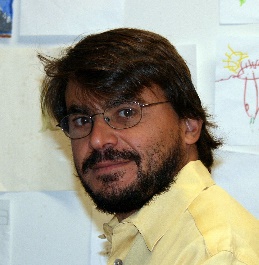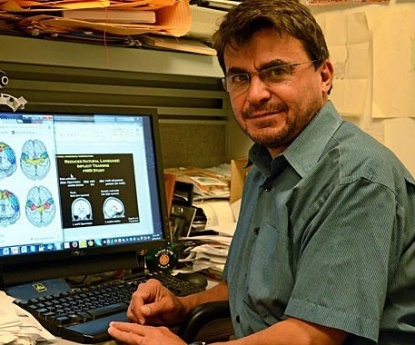Vortrag
second language learning and pedagogy
  |
Prof. Dr. Michael Ullman (Georgetown University, USA, Department of Neuroscience) A talk for the ↗︎ Virtual Laboratory July 16, 2020, 16:00–17:30 Please use this ↗︎ Eventbrite link to register for this FREE EVENT (recommended) Access to the ↗︎ virtual room without registration |
Abstract
I will discuss current theory and evidence regarding the neural and cognitive bases of language learning and processing, and will show how this can help us improve second language learning and pedagogy. In brief, increasing evidence suggests that we learn both first and later-learned (second) languages in two very well-studied general-purpose learning and memory circuits in the brain: declarative memory and procedural memory. Thus, our independent understanding of these circuits, including how learning and memory can be improved, should also apply to language. In this talk I will first present background on the learning and memory circuits, and show how they underlie first and second language learning and processing. I will then discuss how learning, retention, and processing can be improved in these circuits, and how this can help us enhance second language learning and pedagogy
Bio
Michael T. Ullman is an American neuroscientist whose main field of research is the relationship between language, memory and the brain. His Declarative/Procedural model of language has greatly affected the field of psycholinguistics and cognitive neuroscience. Dr. Ullman is Professor in the ↗︎ Department of Neuroscience, with secondary appointments in the Departments of Psychology and Neurology. He is Director of the ↗︎ Brain and Language Lab, and Director of the Georgetown EEG/ERP Laboratory. (See also: ↗︎ more, ↗︎ publications.)
Recommended literature
Ullman, M.T., Earle, F.S., Walenski, M. & Janacsek, K. (2020). The neurocognition of developmental disorders of language. Annual Review of Psychology. 71, 389–417. ↗︎ Online.
Ullman, M.T. (2020) Declarative/Procedural Model. A Neurobiologically Motivated Theory of First and Second Language (Chapter 8), In: VanPatten, B., & Williams, J. (Eds.) Theories in Second Language Acquisition. An Introduction, (pp. 128-161). Routledge. 2nd edition ↗︎ online.
Ullman, M.T, & Lovelett, J.T. (2018). Implications of the declarative/procedural model for improving second language learning: The role of memory enhancement techniques. Second Language Research. 34(1), 39-65. ↗︎ Online.
Ullman, M. T. (2016). How does language depend on general-purpose long-term memory systems in the brain? In G. Hickok & S. A. Small (Eds.), The neurobiology of language (pp. 953–968). New York, NY: Elsevier.
Ullman, M.T. (2015). The Declarative/Procedural Model: A Neurobiological Model of Language Learning, Knowledge, and Use, In: G. Hickok & S.L. Small (Eds.) Neurobiology of Language, Academic Press: lsevier, 953-968. ↗︎ Online.
Ullman, M. T. (2014). Language and the brain. In J. Connor-Linton & R. W. Fasold (Eds.), An introduction to language and linguistics, 2nd ed. (pp. 249–286). Cambridge, England: Cambridge University Press.
Ullman M.T. (2005). A cognitive neuroscience perspective on second language acquisition: The declarative/procedural model. In: Sanz C (ed) Mind and context in second language acquisition. (pp. 141–178). Washington, DC: Georgetown University Press.
Ullman, M.T. (2004). Contributions of memory circuits to language: the declarative/procedural model. Cognition, 92, 231-270. ↗︎ Online.
Ullman, M. T. (2001). A neurocognitive perspective on language: The declarative/procedural model. Nature Reviews Neuroscience, 2, 717–726.
|
The project aims to popularize and promote cognitive and neurocognitive sciences data The Virtual Laboratory (a MOOC-like resource) constitutes an open collection The recorded videoconferences will be available at the webspace ↗︎ Detailed project description If you are interested in presenting a talk within the Virtual Laboratory, |
|



